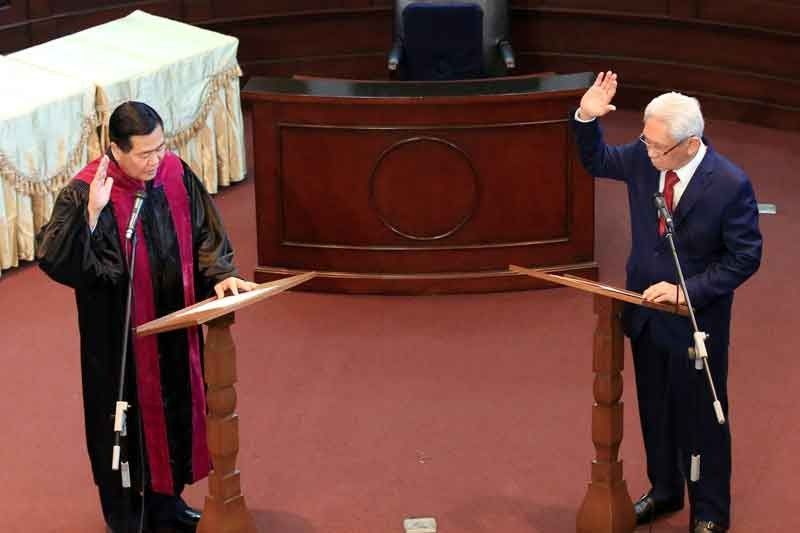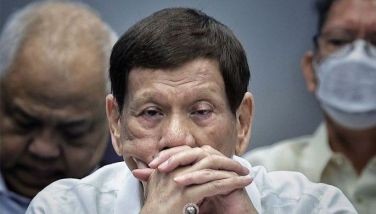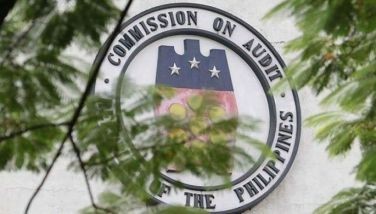Ombudsman Martires says Carandang can appeal dismissal

MANILA, Philippines — Newly appointed Ombudsman Samuel Martires yesterday said he would implement the dismissal order issued by President Duterte against overall deputy ombudsman Arthur Carandang if it becomes final.
In an interview after taking his oath of office in the Supreme Court (SC), Martires said he would have “no choice” but to enforce the dismissal order once it becomes final on the part of Malacañang.
But Martires explained that Carandang has 15 days to appeal the order, which would become “immediately executory” should Malacañang deny his motion for reconsideration.
“I don’t have any discretion with respect to that... I think (Carandang) knows that immediately he has to leave the office,” he explained.
Martires, a former magistrate in the Sandiganbayan prior to his promotion to the SC, said he knew Carandang is “not that hardheaded” and “a very reasonable guy.”
“The provisions on administrative cases are very clear – that it is immediately executory. As a lawyer, Carandang knows what he has to do,” Martires stressed.
The ombudsman added that Carandang could file a petition and seek relief before the SC.
Asked why he would enforce the dismissal order despite the standing 2014 SC ruling that voided the President’s disciplinary jurisdiction over a deputy ombudsman, he replied: “This is a matter that is left to the courts to decide. I don’t want to comment on that at the moment.”
Martires’ predecessor, Conchita Carpio-Morales, refused to enforce an earlier suspension order issued by Malacañang against Carandang due to this jurisprudence.
The order against Carandang emanated from the complaint filed by lawyer Manuelito Luna and suspended lawyer Eligio Mallari in October last year.
The two accused Carandang of corruption for causing “undue injury to any party, including the government,” as well as for giving “unwarranted benefits” through “manifest partiality” and for “divulging valuable information of a confidential character.”
The complaint involved a media interview where Carandang was quoted as saying that his office had already received the bank transaction records of the President’s family from 2006 to 2016 from the Anti-Money Laundering Council (AMLC), a statement later denied by the money laundering watchdog.
Carandang has maintained that his office “has observed confidentiality” in the probe into Duterte and his family’s bank transactions.
In January, Malacañang ordered a 90-day preventive suspension against Carandang after it decided that he had committed grave dishonesty for misuse of confidential information and disclosing false information, under the Anti-Graft and Corrupt Practices law.
But Morales, citing the SC ruling on Gonzales III vs. Office of the President, said the suspension order was “patently unconstitutional.”
The SC ruling held as illegal the administrative disciplinary jurisdiction of the President over deputy ombudsmen. The SC ruled that Section 8(2) of Republic Act 6770 or The Ombudsman Act of 1989 was unconstitutional by granting disciplinary jurisdiction to the President over a deputy ombudsman as it violates the independence of the Office of the Ombudsman.
Ruling may be reversed
A court insider revealed yesterday that the SC may still review the disciplinary authority of the President over deputies of the ombudsman despite its final ruling on the issue in 2014.
“That would depend on whether a petition will be filed before the (SC) and on the grounds to be raised there,” the insider told The STAR.
The source, who spoke on condition of anonymity due to lack of authority to speak for the SC and to possible participation in the resolution of the issue, explained that the SC has in the past recalled and reversed an already final and executory decision.
The insider cited a ruling in 2011 recalling the SC’s 1998 final ruling that declared the retrenchment of over 1,400 flight attendants of the Philippine Airlines as illegal.
“There is that precedent in recalling a decision with an entry of judgment. Again, it would depend on the arguments but the (SC) can correct its mistakes in earlier decisions,” the source pointed out.
The source further stressed that the ruling in the Gonzales case had a “weak value of jurisprudence” considering the 8-7 voting of justices in the decision.
“When you have a split vote of just one margin, that’s historically considered a reversible decision,” the insider said.
The source further cited the changes in the composition of the SC that could possibly lead to reversal of the ruling.
Among the SC justices who voted in the Gonzales case, six have already retired – Associate Justices Arturo Brion, Roberto Abad, Martin Villarama Jr., Jose Perez, Jose Mendoza and Bienvenido Reyes. Brion penned the decision with Abad, Villarama, Perez and Mendoza concurring. Reyes, on the other hand, joined the dissenting vote.
Chief Justice Maria Lourdes Sereno, Senior Associate Justice Antonio Carpio and Associate Justices Diosdado Peralta, Mariano del Castillo and Estela Perlas-Bernabe also dissented in the ruling and voted to keep the President’s power of discipline over the position of deputy ombudsman.
Duterte has three appointees in the SC – Justices Noel Tijam, Andres Reyes Jr. and Alexander Gesmundo. – With Elizabeth Marcelo
- Latest
- Trending

































